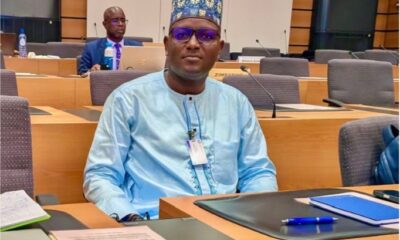Crime
The Trouble With Nigeria’s Solid Minerals Sector

BY GBOGBOWA GBOWA
The recent covert operation by the Nigeria Customs Service (NCS) and the Department of State Security (DSS) that led to the reported shutdown of an illegal bitumen refinery in Oyo State is more than a dramatic sting—it’s a stark reminder of the systemic contradictions plaguing Nigeria’s solid minerals sector. While the federal government touts rising revenues and sweeping reforms, the shadows of illicit exploitation and official silence continue to undermine progress.
At the Southwest Leaders Conference in Akure, Nigeria’s Minister of Solid Minerals Development, Dr. Dele Alake, painted a picture of transformation. Under President Bola Ahmed Tinubu’s “Renewed Hope Agenda,” the sector’s revenue reportedly surged from ₦8.6 billion in 2022 to ₦38 billion in 2025. The Southwest alone contributed ₦7.2 billion this year, with Osun’s Segilola Gold project cited as a model of success.
Dr. Alake emphasized reforms anchored in accountability, community engagement, and security. Initiatives like the Mining Marshals—a specialized unit to combat illegal mining—have reclaimed over 90 sites and prosecuted 300 offenders. He was not done, he added that Community Development Agreements (CDAs) have doubled in two years, promising infrastructure and employment for host communities.
Yet, the Oyo refinery bust tells a different story. Despite the arrest of Chinese nationals and a Nigerian accomplice, the Oyo/Osun Area Command of the NCS denied any knowledge of the operation. For two weeks, officials remained evasive, raising troubling questions about transparency and complicity.
This silence is emblematic of a deeper malaise: while reforms are announced in conferences, illegal mining thrives in border towns and hinterlands. Without diplomacy and politics, the disconnect between policy and practice is not just administrative but existential. Nigeria is bleeding wealth, not only through theft but through institutional inertia where true accountability remains a major missing link.

Dr. Alake’s emphasis on accountability is timely, but the Oyo incident exposes its fragility. If local Customs officials are unaware or unwilling to acknowledge major operations within their jurisdiction, how robust is the chain of oversight? The success of Mining Marshals and CDAs must be matched by a culture of institutional integrity, where silence is not the default response to criminal activity.
To reconcile the government’s reform narrative with ground realities, several steps which are critical are required. First is transparent reporting such as the security operations like the Oyo illegal bitumen refinery bust must be publicly acknowledged and followed by prosecution updates.
There is also need for decentralized oversight where zonal and local commands of security apparatus are held accountable for activities within their zones, with independent audits and whistleblower protections. Also, community vigilance is necessary. CDAs should empower communities not just economically but also as watchdogs against illegal operations.
Unfortunately, the Oyo illegal bitumen refinery is but an inconsequential statistics compared to the economic crimes of illegal gold mining in Zamfara and within, for which Aso Rock, Alake’s Ministry, the Nigerian Military and Police, plus the anti-graft bodies such as the Economic and Financial Crimes Commission (EFCC) have no report about—in a ‘see no evil, hear no evil’ fashion.
The last but not the least is integrated intelligence, where agencies like DSS, NCS, and the Ministry must share intelligence seamlessly to prevent jurisdictional blind spots.
Nigeria’s solid minerals sector stands at a crossroads. The federal government’s revenue figures and reform agenda offer hope, but hope must be matched by vigilance and unquestionable accountability.
The Oyo refinery bust is not just a headline—it’s a litmus test. Will Nigeria confront the silence that enables theft, or will it continue to be a nation robbed twice: first by thieves, then by those who look away?































